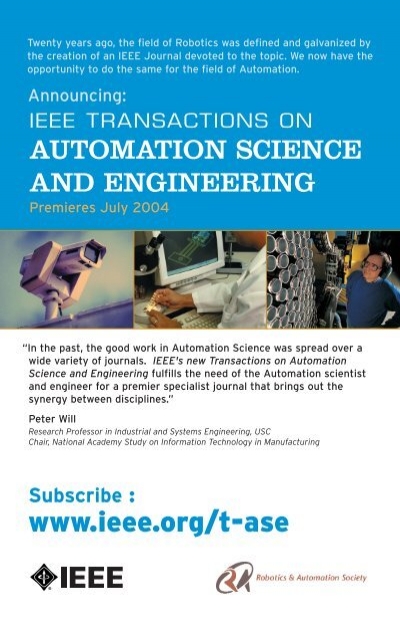基于最大熵原理的多自主水下机器人鲁棒协同定位
IF 6.4
2区 计算机科学
Q1 AUTOMATION & CONTROL SYSTEMS
IEEE Transactions on Automation Science and Engineering
Pub Date : 2025-02-28
DOI:10.1109/TASE.2025.3546674
引用次数: 0
摘要
协作定位旨在为多自主水下航行器(multi-AUV)系统在海洋监测等任务执行过程中持续提供位置估计;其精度高,鲁棒性强,优于非合作方案。然而,水下的各种不确定因素,包括模型不匹配、累积误差、测量噪声和偏差、时变通信信道等,仍然对协同定位的准确性和鲁棒性提出了挑战。当这种不确定性出现时,传统方法的性能会显著下降。因此,本文提出了一种鲁棒的多auv协同定位方法,利用最大熵原理来对抗这些不确定性。在此基础上,设计了基于信念传播的auv分布式位置估计策略。为了减少不确定性的损害,在局部化的预测和校正过程中分别设计了最大熵分布,并由粒子实现。具体而言,通过扩大粒子覆盖范围,可以减轻不确定性引起的位置估计误差,从而获得更高的鲁棒性。仿真和现场实验表明,该算法在定位精度、鲁棒性和可扩展性方面优于目前最先进的方法。从业人员注意:在实际应用中,由于无法在水下使用全球定位系统,AUV定位仍然缺乏成熟稳定的解决方案。在恶劣的水下环境中,大多数理论模型往往不能准确地描述实际情况,导致广泛的不匹配,严重降低了定位性能。此外,累积误差、测量噪声和位置偏差等不确定性会进一步降低位置估计的精度。现有方法通常单独考虑这些不确定因素,而在实际应用中,不确定因素往往是组合出现的,这给保持定位精度带来了挑战。更糟糕的是,大多数设计复杂的算法都追求高精度,难以保证其在工程应用中的适应性。因此,该工作为多auv协同定位提供了一种鲁棒的解决方案,可以同时处理不确定性。通过降低对不同不确定性的敏感性,该算法可以为复杂水下环境下的水下机器人提供持续高精度的位置估计。该方法经实验验证,适用于海洋救援、资源开发、海洋监测等多水下航行器应用。本文章由计算机程序翻译,如有差异,请以英文原文为准。
Robust Multiple Autonomous Underwater Vehicle Cooperative Localization Based on the Principle of Maximum Entropy
Cooperative localization aims to continuously provide position estimates for multiple-autonomous underwater vehicle (multi-AUV) systems during task execution such as marine monitoring; it is preferable over noncooperative schemes due to its high accuracy and strong robustness. However, various uncertain factors underwater, including model mismatches, accumulated errors, measurement noises and biases, time-varying communication channels, etc., still challenge the accuracy and robustness of cooperative localization. When such uncertainties arise, the performances of traditional methods degrade significantly. Therefore, this paper proposes a robust multi-AUV cooperative localization method that is able to combat these uncertainties by leveraging the principle of maximum entropy. To be explicit, a message-passing scheme is established using factor graphs, over which a distributed position estimation strategy for AUVs is designed based on belief propagation. To reduce the damages of uncertainties, maximum-entropy distributions are designed respectively for the prediction and correction processes of localization and are realized by particles. Specifically, through enlarging the particle coverage, uncertainty-induced misleading in position estimation is alleviated, and hence higher robustness is achieved. Simulations and field experiments show the advantages of the proposed algorithm over the state-of-the-art methods in terms of localization accuracy, robustness, and scalability.Note to Practitioners—In practical applications, due to the unavailability of global positioning systems underwater, AUV localization still lacks mature and stable solutions. In harsh underwater environments, most theoretical models often fail to accurately describe the practical conditions, leading to widespread mismatches, which severely degrade localization performance. Moreover, uncertainties such as accumulated errors, measurement noises, and position deviations would further reduce the position estimation accuracy. Existing methods usually consider these uncertainties independently, while, in practical uses, uncertainties often emerge in combination, making it challenging to maintain localization accuracy. What is worse is that most sophisticatedly designed algorithms pursue high accuracy, and their adaptability in engineering applications is difficult to guarantee. Hence, this work provides a robust solution for multi-AUV cooperative localization that can handle uncertainties simultaneously. By reducing the sensitivity to different uncertainties, the proposed algorithm can provide sustained high-accuracy position estimates for AUVs in complex underwater environments. The proposed method is experimentally verified and suitable for multi-AUV applications such as oceanic rescue, resource development, and marine monitoring.
求助全文
通过发布文献求助,成功后即可免费获取论文全文。
去求助
来源期刊

IEEE Transactions on Automation Science and Engineering
工程技术-自动化与控制系统
CiteScore
12.50
自引率
14.30%
发文量
404
审稿时长
3.0 months
期刊介绍:
The IEEE Transactions on Automation Science and Engineering (T-ASE) publishes fundamental papers on Automation, emphasizing scientific results that advance efficiency, quality, productivity, and reliability. T-ASE encourages interdisciplinary approaches from computer science, control systems, electrical engineering, mathematics, mechanical engineering, operations research, and other fields. T-ASE welcomes results relevant to industries such as agriculture, biotechnology, healthcare, home automation, maintenance, manufacturing, pharmaceuticals, retail, security, service, supply chains, and transportation. T-ASE addresses a research community willing to integrate knowledge across disciplines and industries. For this purpose, each paper includes a Note to Practitioners that summarizes how its results can be applied or how they might be extended to apply in practice.
 求助内容:
求助内容: 应助结果提醒方式:
应助结果提醒方式:


